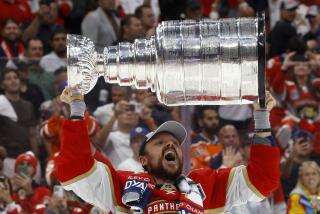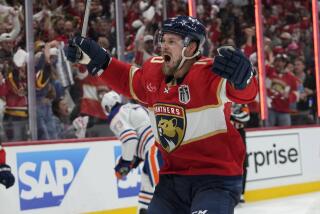Langway and Poulin Star in NHL’s 4-3 Win
- Share via
QUEBEC CITY — Rod Langway said he was almost too embarrassed to play in the game. Dave Poulin was an afterthought, not even a third choice to make the NHL team.
All but unwanted and certainly undervalued, these two veterans outshone their more famous teammates Wednesday night as the National Hockey League’s All-Stars beat the Soviet Union National team, 4-3, in front of a crowd of 15,398 at Le Colisee.
Not all the All-Stars are stars. Some are working class heroes.
Langway, the captain of the Washington Capitals, has been struggling this season on defense. He’s a two-time Norris Trophy winner, but this season his erratic play has left him discouraged.
So disgusted was Langway with his performances, that when he was selected by the NHL coaches to play here, he asked that teammate Scott Stevens go in his place.
The starters on the All-Star team are voted by the fans and the rest are selected by the All-Star staff.
“I was too embarrassed to come here, I didn’t deserve it,” Langway said Wednesday night, smiling despite a split lip he received from Soviet defenseman Alexi Kasatonov.
Langway’s solid performance was all the more surprising because of the amount of time he played--double shifting and playing on the power play. And in a game as fast-paced as Wednesday’s, Langway was working hard.
With Langway and partner Rick Green of Montreal, the NHL defense played beyond expectations. When it was announced this week that defensemen Mark Howe and Paul Coffey would not play because of back injuries, the NHL was given little hope of stopping the fast-skating Soviet team.
Philadelphia’s Poulin was given little chance of being here in the first place. He was a controversial choice at the fourth center spot.
Poulin’s not near the top 20 scorers in the league, he’s a pretty player and he’s most certainly not a star. Not until Wednesday night.
It was Poulin’s tip-in of Mario Lemieux’s shot that was the winning goal.
When asked why he selected Poulin to the team, Coach Jean Perron’s praise sounded more appropriate for a loyal pet than an All-Star center.
“He’s a hard worker, he’s smart, he plays hard both ways,” Perron said. “What we saw on the last goal was a typical Flyers’ goal--straight at the net.”
Langway and Poulin’s efforts didn’t obscure the fine play of Edmonton’s Wayne Gretzky and Mark Messier. Messier was named the NHL’s outstanding player, in part because he won nearly every faceoff he centered.
There was something poetic about the fact that it was Gretzky’s line that scored first. It was the only line that the NHL coaches were able to keep intact--Gretzky, Esa Tikkanen and Jari Kurri.
The NHL staff believed the combination of skill and familiarity would make the line a potent one.
Correct. The three skaters move in concert. Tikkanen took a shot from the left point that bounced to Gretzky. Gretzky slipped a centering pass to Kurri in the slot.
Kurri’s goal set the otherwise sedate sellout crowd into a frenzy. Perhaps, after three days of Rendez-Vous “events”’, the game was an afterthought.
Not to the players. The first period was fast-paced, but tentative.
“In the first period, the teams did not play their games according to plan,” Soviet Coach Victor Tikhonov said through an interpreter. “Both teams were very cautious. Only in the second period did both teams start to play.”
In the second period the NHL strategy began to emerge--cut the ice in half in order to prevent the Soviets patented length-of-the-ice passing combinations.
“We wanted to keep them in the zone,” Langway said. “If they are going to (try to) make those three-line passes, we wanted them to be two-line.
The much-maligned NHL defense established its pattern of finesse, not brutality. Although not swift skaters, the NHL defensive players were smart and persistent.
“Other All-Star teams have tried to physically abuse them (Soviets),” Langway said. “We knew that if we tried to do that, they would make us look stupid.”
It was the Soviet defense that looked less than sharp in allowing the second NHL goal.
Glenn Anderson of Edmonton took the puck behind the net and allowed goaltender Evgeny Belosheikin to believe that Anderson would pass to Hartford’s Kevin Dineen in the slot.
Instead, Anderson wrapped the puck around the net and scored from the right side.
The NHL’s 2-0 lead, however, lasted just one minute 42 seconds. Kasatonov’s shot from the slot--hard and high--was caught by Edmonton’s Grant Fuhr, but he bobbled it and the puck trickled in. A goal by Viacheslav Bykov tied it at 2-2, at 2:03 in the third.
Then Dineen, who said he played his best game this season, scored from the slot. The Soviets answered 61 seconds later.
With the score at 3-3, Rendez-Vous organizer Marcel Aubut’s nightmare seemed about to come true. He desperately wanted to avoid a tie, and the prospect of the NHL’s five-minute sudden death overtime was not pleasing.
It wasn’t necessary. Poulin’s goal at 18:45 gave the NHL the win. And Poulin and Langway much-deserved respect.
Notes Sergei Makarov was named the most outstanding player for the Soviets. Many consider Makarov one of the best players in the world. . . . Tomas Sandstrom of the New York Rangers injured his ankle and did not play in the third period. . . . The final game in the series is Friday night. . . . Not all people in hockey are pleased with this year’s format. Bobby Orr told the Boston Globe, “20 some-odd National Hockey League players are being shafted by their own league,” he said. “The All-Star game is supposed to be a showcase for the 40 best players in the National Hockey League. It’s not supposed to showcase the Soviets. What’s happening this year is a disgrace. The Soviets are using the National Hockey League to their best advantage.”. . . It’s unlikely that this format will ever be used again. NHL President John Ziegler said this week that the league can’t afford to allocate the more than 100 people that organizer Marcel Aubut used to plan this event. “The economics are such that it doesn’t warrant the kind of sacrifices that would have to be made,” Ziegler said. Next year the format will revert to the Campbell Conference versus the Wales Conference, in St. Louis.
More to Read
Go beyond the scoreboard
Get the latest on L.A.'s teams in the daily Sports Report newsletter.
You may occasionally receive promotional content from the Los Angeles Times.







